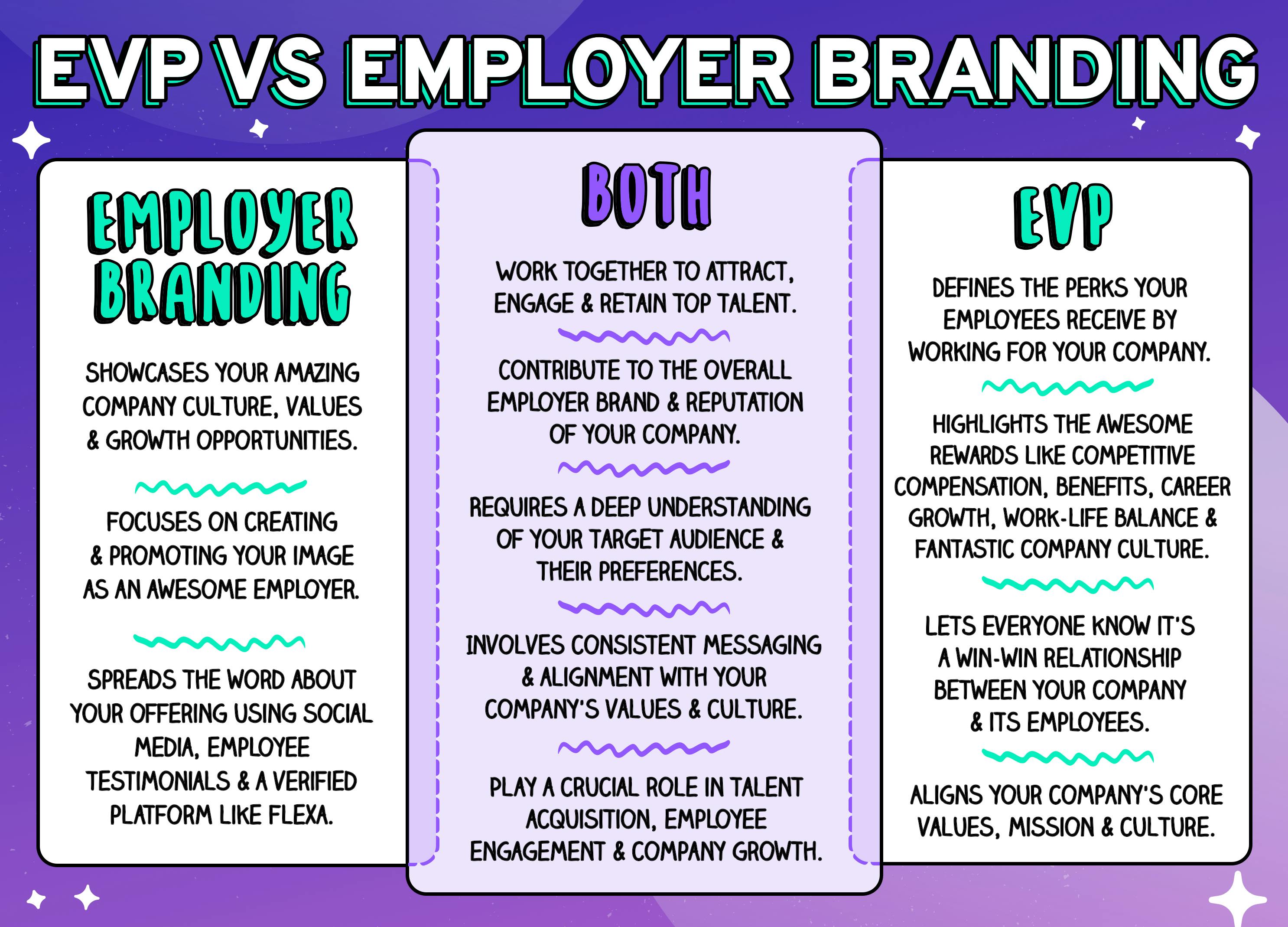EVP vs Employer Branding: what's the difference?
Employer Value Proposition (EVP) and Employer Branding (EB) are essential to attract and retain top talent. But, what is the difference and why should you care?

By Molly Johnson-Jones
CEO & Co-Founder at Flexa
12th Nov 2025
• 5 minutes
💡Key takeaway: Your EVP is what you promise to employees, and your Employer Brand is how that promise is experienced and perceived. When they work in harmony, you attract talent who align with your culture and values — and keep them engaged for the long term.
In the modern job market, where competition for attracting, retaining and engaging top talent is fierce, companies must have a strong Employer Value Proposition (EVP) and Employer Brand (EB) that sets them apart in order to compete. But what exactly do these terms mean, and why is it essential that we understand the difference between them?
Let's first start by emphasising the significance of securing top talent. Exceptional employees drive innovation, growth, and long-term success, which every company wants, right? So to remain ahead of the curve, companies must be able to attract and retain these talented individuals who have the skills, expertise, and passion required to reach company goals.
This is where Employer Value Proposition (EVP) and Employer Branding (EB) come into play. Both concepts are interconnected and are critical in any forward-thinking talent acquisition, retention and engagement strategy, but they each have their own distinct roles and purposes.

By being able to differentiate and understand what those differences are, companies can leverage both frameworks to attract, retain and engage top talent.
Now, let's explore what these differences are in more depth.
What is Employer Value Proposition (EVP)?
Picture this - you're browsing through job postings, searching for your next career move, and you stumble across a company that piques your interest. But what makes it stand out from the rest? That's where your EVP comes in.
So, what exactly is an EVP? Think of it as the ingredients that make your company irresistible to job seekers and the secret sauce that makes your employees stay! It's the unique combination of benefits, rewards, and environment that your company can offer to its employees. EVP is all about answering the question, "Why should I choose this company over others?".
Now, let's break it down a bit further. At its core, EVP is about more than just salary - however, that's important too. It includes these 7 elements that make the employee experience fulfilling and meaningful.
Salary and compensation
First off, let's talk about compensation. EVP includes competitive pay that reflects the skills and contributions you can bring to a company. But it's not just about the numbers on your payslip each month. It's about fair and transparent rewards that recognise your hard work and motivate you to excel.
Work environment
And there’s more. Your EVP should highlight the perks, benefits and workplace environment that come with the job. From flexible working options such as flexitime, fully remote work and remote-first. And benefits like health insurance policies, extended annual leave policies, Work From Anywhere (WFA) schemes, and even employee discounts. A strong EVP makes sure that you're taken care of both inside and outside of the office.
Company culture
Of course, it's not all about the material stuff. Your EVP also includes having a supportive and inclusive company culture that values diversity, collaboration, and work-life balance. It's about having an environment where you feel respected, empowered, and encouraged to grow both personally and professionally.
Values & Mission
Having a clear vision and mission helps employees understand their role in your organisation. When you embed this purpose into your EVP, it can make a big difference in attracting and keeping top talent. Employees want to know how they're contributing to the company's goals as it gives them a sense of purpose and control in their work.
Progression and development
Another crucial element of any EVP is career development. Having opportunities for learning, training, and advancement, whether it's access to mentorship, workshops or clear paths for progression, is a great addition - a killer EVP invests in your employees' future as well as attracts new team members.
Reward and Recognition
Acknowledging your employees' achievements is integral to your EVP. Beyond salary compensation, your team values recognition for their efforts. By celebrating the small wins as well as the big ones, you’re creating a workplace culture that motivates your employees to continue their hard work.
Benefits
Benefits are like the icing on the cake of your EVP; we're talking about all the other exciting stuff that doesn't involve money. Think health insurance, retirement plans, paid time off, family and parental leave, mental well-being support, sabbaticalsand work from home budgets. Taking care of your people and showing commitment to work-life balance can have a hugely positive impact on overall well-being. Within this competitive market, a unique benefits package will help set you apart in attracting, retaining and engaging top talent.
And here's the thing, your EVP is unique to your company; it's not a one size fits all approach. Your EVP should reflect your company's values, mission and culture for it to truly resonate with the candidates you’re looking for.
What is Employer Branding (EB)?
Here’s another scenario. Imagine this, you're scrolling through your social media feed, and you come across a post from a company showcasing their company culture, passionate employees, and impactful work; it catches your attention. That is the power of a strong Employer Brand (EB).
Employer Brand is the reputation and image of your company. It's all about the personality and identity of how your company is perceived by job seekers, employees, and even the general public. Employer Branding goes beyond a fancy logo or catchy tagline and instead is more about creating an authentic yet compelling narrative that showcases what it's truly like to work for your company.
If EVP is the practical manifestation of your company values, then Employer Brand is how you shout about it.
Employer Brand projects into the world your company's values, mission, and culture and the vibes and emotions associated with working there. Think of it as a promise. An Employer Brand promises an experience – an experience of being part of a team that's making a difference, an experience of being supported and valued, an experience of growth and opportunity.
So how is an Employer Brand built? It starts with strategic messaging, communicating your company's values, mission, EVP, and uniqueness that aligns with your audience. It's about crafting stories and showcasing real-life experiences that demonstrate the essence of a company and its people.
Great Employer Branding tactics look like this:
- A strong, up-to-date LinkedIn page.
- Your team posting on LinkedIn.
- A careers page that includes a compelling brand story, engaging company culture, your awesome benefits and perks, DEI efforts, employee testimonials, your application process and timeline and your contact information.
- Showcasing yourself on a verified platform like Flexa.
- Shouting about any company awards you’ve received
This is why employee testimonials play a big role in Employer Branding. Hearing directly from employees about their journeys, successes, and why they love working for a company creates a sense of authenticity and trust. It gives potential candidates a glimpse into what they can expect if they join the team.
Employer Brand also extends to a company's online presence, social media channels, and even community involvement. A strong Employer Brand shows that the company is invested in its employees and pioneering the new way of work.
Differentiating EVP from Employer Branding
Now that you know what both EVP and Employer Branding are, let's look at some practical tips on how you can differentiate them effectively:
1) Define a clear EVP statement
Create a concise and compelling EVP statement that includes the unique benefits and experiences employees can expect from working at your company. This statement should communicate what sets your company apart from others and highlight what makes working for your company truly exceptional. You can use our free project plan template to organise everything effectively.
2) Align EVP with core values and strategic objectives
Make sure that your EVP aligns with your company’s core values and long-term objectives. It should reflect your company culture and demonstrate how employees can contribute to achieving company goals. This alignment helps reinforce authenticity and attracts and retains candidates who share similar values.
3) Leverage Employer Branding initiatives
Use Employer Branding initiatives to amplify your EVP. Maintain consistent brand messaging across the different touchpoints, from your company website to social media channels. Feature employee testimonials that highlight their experiences and showcase your EVP in action. These initiatives build trust and credibility among potential candidates.
4) Monitor candidate and employee feedback
Actively collect and analyse feedback from candidates and employees to gauge the effectiveness of your EVP and Employer Branding efforts; you can use our free employee satisfaction tracker to support you with this. Listen to their perceptions and experiences to identify areas for improvement and ensure that your messaging aligns with their expectations. This feedback loop helps you to refine your strategies and enhances your employer reputation.
5) Continuously evaluate and update strategies
The job market and candidate expectations evolve over time, so it's important to regularly evaluate and update your EVP and Employer Branding strategies. Stay current on industry trends, what your competitors are doing, and the shifting needs of your target talent pool.
By differentiating EVP from Employer Branding and leveraging their strengths, you can create a killer employer proposition while effectively managing your employer brand. Remember, a strong EVP attracts the right talent, while a well-crafted Employer Brand enhances your reputation and sets you apart as an employer of choice. Strive for alignment, authenticity, and continuous improvement, and you'll be well on your way to attracting, retaining and engaging exceptional talent.
FAQs about Employer Branding vs EVP
1. What is an Employer Value Proposition (EVP)?
Your EVP is the unique set of benefits, rewards, and experiences you offer employees in exchange for their skills and commitment. It defines why people should join and stay with your company.
2. What is Employer Branding?
Employer Branding is how your EVP and company culture are communicated and perceived by potential and current employees. It’s the reputation your company builds as a place to work.
3. How are EVP and Employer Branding connected?
Your EVP is the foundation, and your Employer Brand is the expression of it. A strong Employer Brand brings your EVP to life through storytelling, visuals, and consistent messaging across every candidate and employee touchpoint.
4. Why is understanding the difference important?
Knowing the difference helps companies create authentic and consistent messaging. When your EVP and Employer Brand are aligned, you attract the right candidates and build trust internally and externally.
5. How can I improve my EVP and Employer Brand?
Start by understanding what your employees truly value, then clearly communicate that through your branding and recruitment marketing. Platforms like Flexa Careers can help showcase your EVP to millions of candidates looking for companies that align with their values and working preferences.